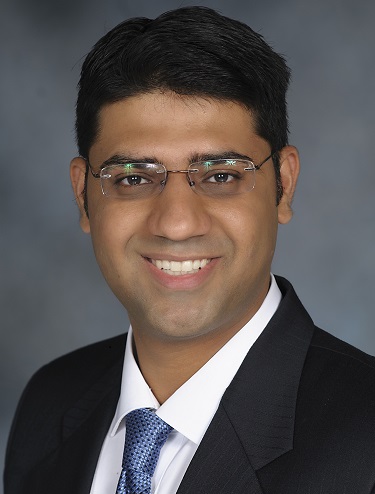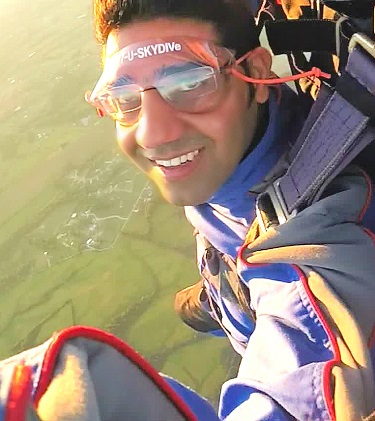Nirmanmoh Bhatia, MD
After seeing the instantaneous effect an interventional cardiology procedure can have on a patient, this fellow felt compelled to pursue this career path.
 Nirmanmoh Bhatia, MD, is completing his fellowship in interventional cardiology at Vanderbilt University Medical Center (Nashville, TN). Educated at the Maulana Azad Medical College (New Delhi, India), he completed his medical and cardiology training at the University of Louisville School of Medicine (Louisville, KY) and Vanderbilt University Medical Center, respectively. Bhatia also completed a research internship in cardio-oncology at the University of Texas MD Anderson Cancer Center (Houston, TX). He has published almost 30 research papers in peer-reviewed journals and has won multiple travel grants to present his findings at meetings such as the American Society of Echocardiography and the Heart Failure Society of America. He has been actively involved in healthcare legislation and was awarded grants as the fellow representative from the state of Tennessee for the national American College of Cardiology Legislative Conference in 2015 and 2016. After training, Bhatia is looking forward to pursuing a career in either the academic or private-practice setting that will allow him to practice complex coronary and structural heart interventions and conduct cardiovascular outcomes research.
Nirmanmoh Bhatia, MD, is completing his fellowship in interventional cardiology at Vanderbilt University Medical Center (Nashville, TN). Educated at the Maulana Azad Medical College (New Delhi, India), he completed his medical and cardiology training at the University of Louisville School of Medicine (Louisville, KY) and Vanderbilt University Medical Center, respectively. Bhatia also completed a research internship in cardio-oncology at the University of Texas MD Anderson Cancer Center (Houston, TX). He has published almost 30 research papers in peer-reviewed journals and has won multiple travel grants to present his findings at meetings such as the American Society of Echocardiography and the Heart Failure Society of America. He has been actively involved in healthcare legislation and was awarded grants as the fellow representative from the state of Tennessee for the national American College of Cardiology Legislative Conference in 2015 and 2016. After training, Bhatia is looking forward to pursuing a career in either the academic or private-practice setting that will allow him to practice complex coronary and structural heart interventions and conduct cardiovascular outcomes research.
What has surprised you most about becoming an interventional cardiologist?
The most surprising thing about the field has been how challenging some of these procedures can be. As a general cardiology fellow, I would watch others do some of the procedures and think that it all seemed very easy—crossing a lesion with a wire, dilating with a balloon, and deploying a stent. But a lot of these procedures are not easy. They require high levels of skill and training, and the atmosphere in the cath lab is so charged because you are doing something which is very dangerous in the hope of helping a patient. One small mistake can lead to catastrophe. Your time to react and collect yourself is very short. So you have to be on your toes and be vigilant at all times and never relax, as things go wrong when you least expect them to. Despite all of that, if you follow protocols, most of the time these procedures tend to go really well. With the use of advanced techniques, we’ve been able to help a lot of the patients with complex coronary, peripheral, and structural heart disease who would not have had any therapeutic options in the recent past.
What has been your most meaningful clinical experience thus far?
When I started my fellowship, I was interested in cardiac imaging and valvular disease. Early during my second year, there was a 55-year-old gentleman who was admitted with progressive angina and he was scheduled to undergo bypass surgery for complex triple vessel disease. His EF was extremely low at 10%, and before he could go for surgery he had a VT storm. The surgeons felt like he was already a high-risk case for them and that he would probably benefit more by getting percutaneous revascularization. This gentleman had complex, trifurcation disease. We took him to the cath lab and the Impella device helped us stabilize him. We had to do this in an emergent setting, because he was having repeated episodes of VT storm and cardiac arrest. After navigating his complex anatomy with the use of a guide extension catheter, atherectomy device, and angled microcatheters, we were able to stent his lesions and restore blood flow to his heart. He had a complete recovery and walked out of the hospital a few days later. So that was one of the many experiences that convinced me that this is a specialty which helps patients who were previously considered to have prohibitive risk for heart surgery. Although very challenging, once we are able to successfully perform these high-risk percutaneous interventions, the response can be almost instantaneous and this is immensely gratifying. Once you see miracles like this, you really are drawn toward a specialty. I felt like there was nothing in medicine or cardiology that would have been more rewarding for me and I had to become an interventional cardiologist.
How do you see the field changing in the next 5 years?
The field is going to evolve very rapidly. In cardiology in general and interventional cardiology in particular, there are many clinical trials enrolling patients currently. We will continue to generate tons of data, which is probably the best thing about practicing cardiology as almost everything you do is evidence-based. That gives me confidence about the care we provide to our patients. The second thing is there are a plethora of devices that are in various phases of development, so procedures which were once considered nearly impossible a decade ago are becoming mainstream. We have multiple options for percutaneous mechanical circulatory support, different stents, valves, and various devices for structural heart disease. There are numerous companies working on percutaneous mitral and tricuspid valve therapies and making these procedures easier and more universally applicable. A lot of patients with mitral and tricuspid valve diseases who don’t have good options today will probably be candidates for such therapies in the very near future. I also foresee increasing application of new technologies such as artificial intelligence, robotics, and 3-D printing to aid in simplifying and improving the outcomes of percutaneous interventional cardiology procedures.
What is the biggest challenge facing interventional cardiology fellows today?
Firstly, it’s keeping up to date, because every day there is a new device, new procedure, and new data coming out, and getting that adequate experience and training during fellowship is not sufficient. Once you're in practice, you have to go out there and keep yourself updated. It is essential to attend courses and meetings and learn from your peers. Secondly, the field has expanded so much that to be really good at what you do, you have to find a niche and also find a job that allows you to practice those niche skills. For example, if you're interested in structural heart disease, you probably should be doing more of those procedures rather than trying to do all the other peripheral and coronary procedures that you've been trained in.
Who has had the biggest impact on your cardiology career and why?
My biggest mentor has been Marcus Stoddard, MD (University of Louisville, KY). He's an internationally renowned echocardiographer and cardiologist. During my residency, he was the one who got me really interested in valvular heart disease. More importantly, he infected me with this passion for echocardiography, cardiovascular medicine, and clinical research. He’s an extremely busy clinician who would do his clinical duties until 9 or 10 PM, and after that he would work with me on our research until the early morning. He had probably very little to gain from it personally, and was just doing it for me and for his passion for clinical research. So that’s when I learned that nothing is really impossible if you make your nights and weekends work for you—you can pretty much accomplish anything. Despite being at the apex of his field, he is extremely humble and down to earth. No task is too small for him and he led by example, which I hope to emulate.
What is something people might not know about you?
 I love adventure sports! Skydiving, SCUBA, and whitewater rafting are my favorites. I’m always up for an adventure. I’m also a big foodie and I love trying new cuisines and dishes, and I am pretty much up for trying anything and everything anytime!
I love adventure sports! Skydiving, SCUBA, and whitewater rafting are my favorites. I’m always up for an adventure. I’m also a big foodie and I love trying new cuisines and dishes, and I am pretty much up for trying anything and everything anytime!
What his nominator, Amit Keswani, MD (Vanderbilt University Medical Center), says:
Bhatia is a very intelligent fellow with exceptional growth potential. His clinical knowledge and acumen are very good, and his technical ability is advanced for his level of training. He has also demonstrated an enthusiasm for academic opportunities, with continued abstract presentations at SCAI and TVT most recently. He is active on Twitter and involved in the FIT community as well.
*To nominate a stellar cardiology fellow for the Featured Fellow section of TCTMD’s Fellows Forum, click here.
Yael L. Maxwell is Senior Medical Journalist for TCTMD and Section Editor of TCTMD's Fellows Forum. She served as the inaugural…
Read Full Bio

Comments